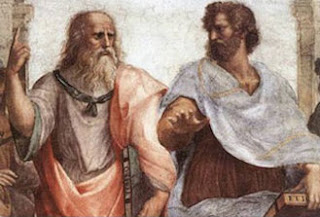The Western, world through the lens of the
Gospel, found its source not in cosmic principle, nor in mythological figure,
but in the historical person of Jesus Christ.
Out of the encounter with him, the
order of the Universe wasn’t an unchanging cycle, nor a fatal law of necessity,
but a divine drama whose successive acts were the Creation and the Fall, and
the Redemption – the glorious restoration.
The Church’s first fight was with
Gnosticism, which sought to combine belief in spiritual redemption with the
illusory nature of earthly change. No, says the Church, there is historical
development!
The expansion of the Church in the 3rd
and 4th centuries was not the natural culmination of the religious
evolution of the ancient world, but a violent interruption of that process.
In doing so a real humanism arose
within the culture – man is the centre and crown of the created universe. He is
not subject to a cyclical process, but is the channel through which the whole
of creation is united with God.
Created nature passes through some
process of evolution and, as long as it acts in accordance with nature, this
process will be progressive. But if it acts against nature, this process will
be degenerative. In fact, the latter case is what has historically taken place
– in the Fall man acted against his nature and the process of growth towards
human fullness was abruptly terminated and set on a ‘fallen’ course. In response
to this the Divine Nature united itself with mankind in a second creation,
which restored and further developed humanity’s potential.
There was a sharp divide between what
took place in the East and in the West. In the East, the nostalgia for the
infinite turned people away from the world of experience towards seeking an
eternal vision of transcendent Being.
In the West, Christianity became a
dynamic and social force. A new civilisation arose in Europe based upon an
ecclesiastical unity, not upon a political one. The Church was the universal
society and the State was the weaker partner.
In the East, the State was the
universal society within which was the Church.
In the West there was no common
material culture; the formative element of civilization was the spiritual. The
centre of Europe was a spiritual citizenship. Hence, medieval Europe we see the
contrast between cruelty and charity, between beauty and squalor. But what
arose from this this spiritual focus was a democratic spirit, in which
voluntary associations and Guilds arose. This movement of communal activity
transformed social life in the Middle Ages.
What didn’t arise in Europe was a
theocratic Church-State, and what prevented this from arising was the spiritual
revival in the 12th century which focused on the humanity of Christ.
The Incarnation spoke of the ennoblement of the person and his or her dignity.
Instead of the Byzantine majesty of the Christ Pantocrator, the West placed the
crucified Christ at the centre. Christ in his human weakness spoke of the
personal relationship which he seeks with each of us, rather than a more
theological piety. Medieval westerners sought to relive the life of Christ in
daily life; faith and life became united.
In so doing the mission of that era of evangelization reached its zenith
– faith and life together. It was Paul VI, who in 1975, first announced the new
evangelization, recognizing the signs today that speak of faith and life having
come apart. There is very much a real nostalgia in the Church in the West for
that form of Christianity that is passing – faith and life united. But although
the new evangelization began because these two have come apart, I think that a
new and different form of Christianity will arise because of the new
evangelization. I think that precisely because new ‘Christian subjects’ are going
to be formed from ‘modern’ people, people whose personality and culture have
the Enlightenment written all over them. Perhaps a greater conversion will come
in the era of the new evangelization, a conversion which comes out of the
depths of despair.



















